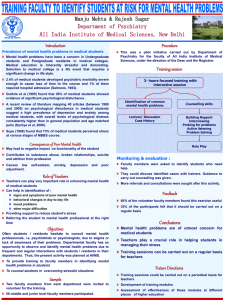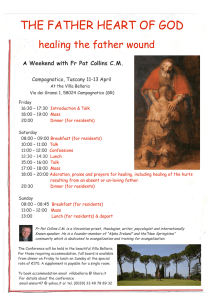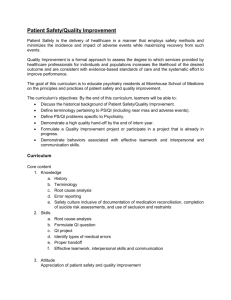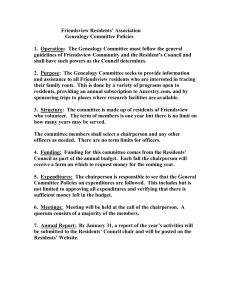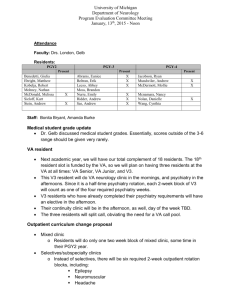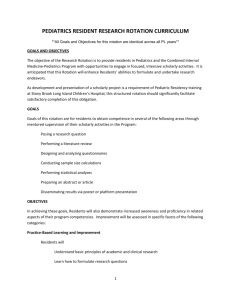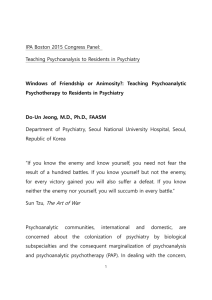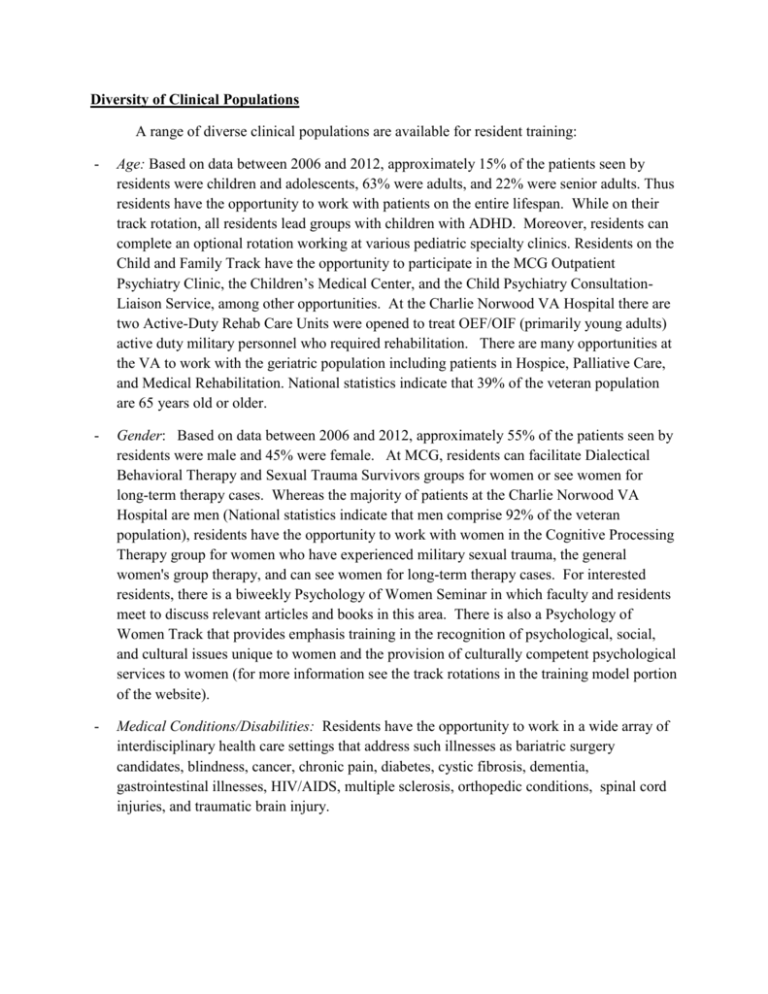
Diversity of Clinical Populations
A range of diverse clinical populations are available for resident training:
-
Age: Based on data between 2006 and 2012, approximately 15% of the patients seen by
residents were children and adolescents, 63% were adults, and 22% were senior adults. Thus
residents have the opportunity to work with patients on the entire lifespan. While on their
track rotation, all residents lead groups with children with ADHD. Moreover, residents can
complete an optional rotation working at various pediatric specialty clinics. Residents on the
Child and Family Track have the opportunity to participate in the MCG Outpatient
Psychiatry Clinic, the Children’s Medical Center, and the Child Psychiatry ConsultationLiaison Service, among other opportunities. At the Charlie Norwood VA Hospital there are
two Active-Duty Rehab Care Units were opened to treat OEF/OIF (primarily young adults)
active duty military personnel who required rehabilitation. There are many opportunities at
the VA to work with the geriatric population including patients in Hospice, Palliative Care,
and Medical Rehabilitation. National statistics indicate that 39% of the veteran population
are 65 years old or older.
-
Gender: Based on data between 2006 and 2012, approximately 55% of the patients seen by
residents were male and 45% were female. At MCG, residents can facilitate Dialectical
Behavioral Therapy and Sexual Trauma Survivors groups for women or see women for
long-term therapy cases. Whereas the majority of patients at the Charlie Norwood VA
Hospital are men (National statistics indicate that men comprise 92% of the veteran
population), residents have the opportunity to work with women in the Cognitive Processing
Therapy group for women who have experienced military sexual trauma, the general
women's group therapy, and can see women for long-term therapy cases. For interested
residents, there is a biweekly Psychology of Women Seminar in which faculty and residents
meet to discuss relevant articles and books in this area. There is also a Psychology of
Women Track that provides emphasis training in the recognition of psychological, social,
and cultural issues unique to women and the provision of culturally competent psychological
services to women (for more information see the track rotations in the training model portion
of the website).
-
Medical Conditions/Disabilities: Residents have the opportunity to work in a wide array of
interdisciplinary health care settings that address such illnesses as bariatric surgery
candidates, blindness, cancer, chronic pain, diabetes, cystic fibrosis, dementia,
gastrointestinal illnesses, HIV/AIDS, multiple sclerosis, orthopedic conditions, spinal cord
injuries, and traumatic brain injury.
-
Race/Ethnicities: Based on data between 2006 and 2012, approximately 50% of patients
seen by residents were with African American patients, 47% were with Caucasian patients,
2% were with Hispanic patients, 1% were patients with other race/ethnicities.
-
Sexual Minorities: Residents can work with Lesbian/Gay/Bisexual/Transgender (LGBT)
individuals in a variety of settings. For example, the adult infectious disease clinic
population (during the Medical Psychology rotation) will be approximately 50% Men who
have sex with Men (MSM).
-
Socioeconomic status: Based on data between 2005 and 2009, the MCG Outpatient
Psychiatry clinic serves patients with the following financial support: 50% private insurance,
21% Medicaid, 19% Medicare, 3% with self, and 7% other forms of support. The clinic's
catchment area extends to many of the MHMRSA Region 2 counties that are federally
designated mental health underserved areas counties. Approximately 29.2% of Georgia's
Estimated Underserved Population are living in Mental Health- Health Professional
Shortage Areas (HPSAs), as of September 2008. Approximately 16% of families in the
Augusta area are living at or below the poverty line.
-
Spirituality/Religion: The importance of religious and spiritual life to patients and use as a
primary coping resource is seen amongst many patients residing in this region.
Approximately 43% of the people in Augusta-Richmond County Metro Area, GA affiliate
with a religion. Of those individuals, approximately 4% are Catholic; 23% are Baptist, 36%
are Protestant; 1% are LDS; 2% are another Christian faith; 0.3% are Jewish; 0.1% are an
Eastern faith; 0.2% affiliate with Islam.




